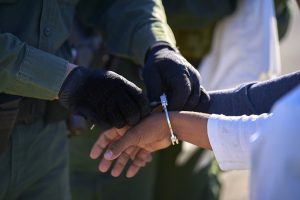 -Editorial
-Editorial
Immigrant survivors of domestic violence are encountering new obstacles to safety as critical legal and funding protections erode. Survivors applying for U visas, given to victims of violent crime, or VAWA visas, which allow survivors to petition for immigration status separate from an abusive partner, face greater scrutiny and stricter application procedures. Asylum protections for gender-based violence survivors have also been gutted.
New anti-DEIA restrictions have been enforced for DV organizations that receive grant funding from federal agencies, including the Office of Violence Against Women, and the Department of Housing and Urban Development. The looming specter of ICE raids has created an overwhelming climate of fear in immigrant communities: many survivors of domestic violence are not reporting their abuse.
Carmen McDonald opened her remarks by addressing the underreporting of domestic violence cases over the past seven months, explaining that this trend is deeply connected to heightened immigration enforcement. As the Executive Director of the Survivor Justice Center, she emphasized her organization’s role in providing free legal services for low-income survivors in Los Angeles County, with a special focus on family law and immigration. The center also uses a holistic model that integrates social work, recognizing that survivors face multiple, intersecting barriers when trying to escape abuse and rebuild their lives.
McDonald noted that about 70% of their clients are immigrants, reflecting Los Angeles’s large immigrant population. When ICE raids began, fear spread far beyond the individuals directly targeted, silencing survivors who might otherwise seek help. The result has been devastating, people are avoiding legal protections, dropping medical appointments, refusing to report crimes such as wage theft, and disengaging from services that could protect them and their families.
She shared that reports of discrimination and hate crimes in Los Angeles County dropped by one-third after raids began, not because incidents decreased, but because people were too afraid to report. A similar pattern is now evident in domestic violence cases. Survivors fear being detained if they appear in court, even remotely, or if they interact with police officers. Some clients have told staff that they fear their abusers will retaliate by reporting them to ICE, a tactic that has long been a threat but is now seen as an even greater reality.
McDonald shared troubling examples of how fear is silencing survivors: one client canceled her restraining order and disappeared, others are skipping essential medical care such as dialysis, and many avoid reporting car accidents or serious crimes to police out of fear of immigration consequences. This anxiety has spilled into daily life, with survivors avoiding public transportation, the DMV, schools, and even their landlords, further isolating them and leaving them without critical support.
The impact is also seen in children’s lives: one nonprofit reported that only half of the students registered for summer programs showed up, due to fear within immigrant families.
McDonald described how discouraging this has been for her team, who have spent decades educating survivors that they are protected under laws like VAWA (Violence Against Women Act) and should not fear deportation for speaking out. Yet recent events have undermined that trust. She cited a recent case of a VAWA client detained after ICE initially came looking for her partner and then returned to arrest her, deepening the community’s fear.
She also referenced a recent Supreme Court ruling, where the dissent highlighted the traumatic and disruptive nature of seizures based on appearance, work, or speech. This, McDonald argued, creates a chilling effect that discourages survivors from coming forward and reporting abuse.
McDonald urged policymakers, advocates, and the public to recognize that silencing survivors endangers everyone, and to continue supporting outreach efforts that reassure survivors of their rights and protections.
Morgan Weibel, Director of Client Advocacy/Legal Services at the Tahirih Justice Center, delivered a presentation on the tightening restrictions affecting immigrant survivors of gender-based violence who seek legal relief through VAWA, U visas, T visas, and asylum. She began by underscoring the mission of the Tahirih Justice Center, a national nonprofit that provides free legal and social services to immigrant survivors. Survivors, she noted, are courageous individuals trying to protect their lives and the lives of their children, but current policies have created a climate of fear that discourages many from coming forward. For example, she shared the case of a woman seeking VAWA protection who was threatened with deportation by a sheriff when serving her abuser with a protective order. Stories like these illustrate how survivors often hesitate to pursue the protections they are legally entitled to because of the risk of detention or removal.
Weibel provided a historical overview of the Violence Against Women Act (VAWA), passed in 1994, which gave survivors of abuse by U.S. citizens or lawful permanent residents the ability to apply for legal status without their abusers’ involvement. She explained how VAWA, along with U and T visas, created to protect survivors of crime and trafficking while assisting law enforcement, were intended to empower victims and enhance public safety. However, she warned that recent government actions, including expanded vetting, mandatory interviews for VAWA applicants, and the placement of denied applicants into deportation proceedings, have made these protections harder to access and riskier to pursue. Survivors who might have once sought help are now deciding not to apply at all, fearing the consequences of interacting with the immigration system.
Turning to asylum, Weibel expressed concern over recent Department of Justice rulings that rolled back recognition of domestic and gender-based violence as valid grounds for asylum, reversing decades of progress. While asylum law requires individualized case review, restrictive interpretations are leading to greater burdens on attorneys, such as requiring more extensive survivor testimony, expert witnesses, and lengthy legal arguments. For unrepresented survivors, she cautioned, the chances of success are now extremely low. This uneven application of the law means geography, specifically, which federal circuit court handles the case, can determine a survivor’s fate, a situation she described as unjust and life-threatening, since deportation often returns women to countries where they face femicide and other grave dangers.
Weibel concluded by stressing the need for systemic solutions, including legislation to create gender as a recognized ground for asylum and reforms to disentangle local law enforcement from immigration enforcement, so survivors can safely seek protection. She reaffirmed that while restrictive policies are concerning, they cannot erase years of advocacy and progress enshrined into law by bipartisan support. The Tahirih Justice Center will continue to stand with survivors, ensuring their voices and needs remain central in the fight to end gender-based violence in all its forms.


